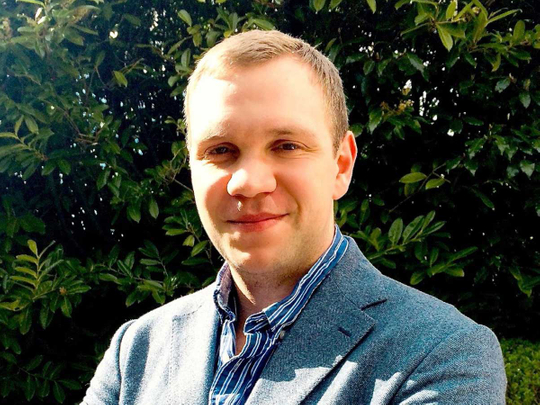
Abu Dhabi: British national Matthew Hedges who was granted clemency by the UAE President on Monday after being convicted for spying last week was using two different identities to gather information from targets in the UAE, officials said.
“During the investigations, it emerged that Hedges had been using two different identities. In one, he was Matthew Hedges, the PhD researcher. In another, he was Matthew Hedges, the businessman. He was part-time PhD researcher, part-time businessman, but primarily he was 100% a full-time secret service operative,” said the government statement read out by Jaber Al Lamki, Executive Director of Strategic and Media Communications at the National Media Council, at a press conference in the capital on Monday.
In a video shown by the officials, Hedges was seen admitting that he was a ‘captain’ with M16, the foreign intelligence service of the UK government. The information that Hedges collected went far beyond standard academic practice as he took advantage of the openness granted to academic researchers in this country, the spokesman said.
“We are a country that hosts branches of some of the world’s finest academic institutions, and we pride ourselves in our contribution to scientific advancement and academic pursuits,” Al Lamki said.
“Hedges was found guilty of espionage. He sought out sensitive information from people he knew had access to it. He was here to steal the UAE’s sensitive national security secrets for his paymasters,” the official said.
_resources1_16a0852557d_author.jpg)
He sought out sensitive information from people he knew had access to it. He was here to steal the UAE’s sensitive national security secrets for his paymasters.”
However, “continuing a tradition established by Shaikh Zayed, as part of our National Day celebrations, the President of the UAE, His Highness Shaikh Khalifa Bin Zayed Al Nahyan, yesterday [Sunday] granted gracious clemency to 785 prisoners across the UAE to mark the 47th anniversary of this great nation.”
“In response to a letter from the family of Hedges requesting clemency — and in consideration of the historical relationship and close ties between the UAE and the UK — His Highness decided to include Matthew Hedges among the 785 prisoners released. Hedges will be permitted to leave the country once the formalities are completed,” the spokesman explained.
“Because of the sensitive nature of the case, unfortunately we cannot share more details of the materials found in Hedges’ possession,” Al Lamki said.
However, the official revealed that during his early days in the UAE, Hedges worked for a strategy and security consultancy — the Institute for Near East and Gulf Military Analysis, known as INEGMA — who specialised in military and security conferences. Through this, he was able to build up an extensive network of contacts.
“After working in the UAE for several years, Hedges left the UAE. Following our investigation, we understand that his background and the networks he had cultivated led to his recruitment,” Al Lamki said.
He subsequently returned to the UAE on assignment, undercover as a student on a research trip. He did not require a visa [as a British national] and entered the country freely.
Following a tip off to the Attorney General’s office regarding his suspicious activities, an investigation team was established to look into these serious claims. The investigators ensured that every rule and internal process were strictly adhered to and Hedges was arrested on May 5.
He confessed to the investigators that he had four objectives such as gathering classified information on the UAE’s military capabilities, including weaponry and procurement decisions; sensitive economic data on the country’s key firms and key industries, along with strategic planning information; sensitive information on key government figures, including members of the UAE’s ruling families and their networks; and classified information on the UAE’s military and political role in Yemen, the spokesman explained.
“In any country, these would be considered serious threats to national security, just as they were here in the UAE,” Al Lamki said.
Who is Mathew Hedges?
■ Matthew Hedges, 31, is said to have been studying for a PhD at Durham University.
■ He was arrested on May 5, 2018, at Dubai International Airport, and charged with posing as an academic researcher to spy for a foreign government. He was planning to leave the country, along with the information he had collected, according to a UAE Government spokesman.
■ During the investigation, Hedges confessed he was acting as an agent of a foreign intelligence service. He confirmed that he had collected sensitive and classified information about the UAE for that agency.
■ On November 21, the Abu Dhabi Federal Court of Appeals sentenced Hedges to life imprisonment. It was for the crime of espionage against the UAE on behalf of a foreign agency.
■ Throughout this process, officials said, Hedges was also accorded his full rights as a defendant, as per the UAE law. Hedges made and received 27 phone calls to immediate family members during the pretrial stage. In addition to this, he was provided with full medical care, which included twice-weekly check-ups by a doctor. These are rights given to prisoners throughout the UAE.
■ As required under UAE law, a defence lawyer was assigned to Hedges at the Government’s expense. This was arranged when it became clear that he could not provide his own. He was also provided with a translator, who was present each time he was questioned.
■ The trial was held behind closed doors due to the sensitivity of the evidence presented. But the defendant’s family and embassy staff were present at all hearings.
■ Hedges’ trial took place over four full sessions in court. Last Wednesday’s hearing was a sentencing hearing, and not part of the trial itself.








